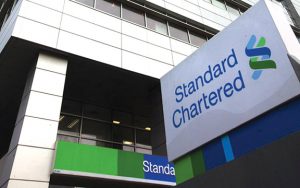Bloomberg
A strong quarter from Standard Chartered Plc’s traders provided a boost to the emerging market-focused bank despite fears that a slowing global economy could squeeze its lending business.
The London-based bank reported underlying pretax profit rises 7% to $1.32 billion in the second quarter, as its traders benefitted from volatility in global markets along with many of its Wall Street peers. Analysts had estimated profit of just under $1.1 billion.
The lender announced a $500 million share buyback and plans to return more than $5 billion to shareholders over the next three years.
Financial markets revenue rose 8% compared to the same period a year ago, continuing the bank’s strong run in trading. That follows 32% growth in the first quarter, which prompted an upgrade to bank’s full-year forecasts at the time.
Its macro trading business posted a 16% jump in operating income to $664 million for the second quarter amid volatility in the commodity and foreign exchange markets.
Standard Chartered hinted in June that it was on course for another bumper result with Simon Cooper, chief executive of corporate, commercial and institutional banking, saying at an investor event that trading conditions had improved year-on-year in April and May.
After more than seven years as CEO, Bill Winters has started to see results from his turnaround of Standard Chartered. Shares in the bank have risen by more than 25% this year, helped by rising interest rates and the promise of greater capital returns to shareholders. Concerns about costs have started to fade as the bank’s revenue growth outpaces corporate spending.
“We remain disciplined on expenses, with significant savings delivered and maintained a strong capital position,†Winters said in a statement. “We remain confident in the delivery of the financial targets we set out in February.â€
Like its rival HSBC Holdings Plc, Standard Chartered is heavily exposed to the fortunes of Asian economies, in particular Hong Kong, which is the largest market for both banks.
Standard Chartered reiterated plans to build its business in China even as it took $237 million of impairments against Chinese commercial real estate in the first half. It said it has $3.7 billion of exposure to the sector.
“HSBC and Standard Chartered face more loan risks in China’s commercial real-estate market than they do in other wholesale lending and mortgages,†Bloomberg Intelligence analyst Francis Chan wrote in a recent note. Chinese risk accounts for about a fifth of total group credit exposures at HSBC and Standard Chartered, according to Bloomberg Intelligence.
 The Gulf Time Newspaper One of the finest business newspapers in the UAE brought to you by our professional writers and editors.
The Gulf Time Newspaper One of the finest business newspapers in the UAE brought to you by our professional writers and editors.
